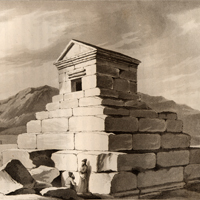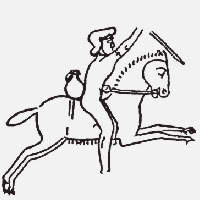
program and website founded by Pierre Briant
The Achaemenid Persian Empire
from the Bosphorus to the Indus
river, from 550 to 330 B.C.
from the Bosphorus to the Indus
river, from 550 to 330 B.C.
search
Publications
Achaemenid museum and Iconographic resources
Textual sources
my space
You are not connected
I have my space
Please enter your identifiers to connect to your space
I forgot my password
You will be sent your password
Please type your emai.l
I create my space
Please type your email and a password of at least 6 characters to create your space.
Processing...
Change my password
Please type your password et a new one with at least 6 characters.
Change my email
Please type your password and a new valid email
back to folders

x
Créer mon espace
En créant votre espace vous pouvez mémoriser les fiches de manière permanente et les rappeler d'une session l'autre.
- Cliquez sur l'onglet "Je n'ai pas d'espace".
- Saisissez votre adresse mail et un mot de passe d'au moins 6 caractères.
- Cliquez sur le bouton "créer".
- Une demande de confirmation vous sera envoyée par mail. Vous devrez cliquer sur le lien interne afficher dans ce mail pour activer votre espace.
Modifier mes identifiants
Vous devez auparavant être connecté à votre espace.
- Cliquez sur votre email qui apparaît en haut à gauche du panneau "mon espace".
- Pour changer votre mot de passe cliquez sur l'onglet "Changer mon mot de passe".
- Pour changer votre adresse mail cliquez sur l'onglet "Changer mon email".
 Créer un dossier
Créer un dossier
Vous pouvez classer vos fiches dans des dossiers. Pour Créer un dossier :
- Cliquer sur ce bouton pour créer un nouveau dossier.
- Saisissez un nom de dossier.
- Cliquez sur le bouton "ok" pour créer le dossier.
- Cliquez sur le bouton "-" ou "x" pour abandonner la procédure.
 Renommer un dossier
Renommer un dossier
- Cliquer sur ce bouton pour éditer le nom du dossier.
- Saisissez un nouveau nom.
- Cliquez sur le bouton "ok" pour enregistrer la modification.
- Cliquez sur le bouton "-" pour abandonner la procédure.
 Supprimer un dossier
Supprimer un dossier
Cette action supprime toutes les fiches mémorisées dans le dossier.
- Cliquer sur ce bouton pour supprimer le dossier.
- Cliquez sur le bouton "-" pour abandonner la procédure.
- Cliquez sur le bouton "x" pour supprimer la procédure.
 Mémoriser une fiche
Mémoriser une fiche
Depuis la fiche :
- Cliquer sur ce bouton situé en haut à droite de la fiche.
- Dans la liste déroulante qui apparaît à côté du bouton, sélectionnez le dossier dans lequel vous souhaitez enregistrer la fiche .
- Le message "document enregistré" apparaît en remplacement de la liste pour vous confirmer que l'action a été effectuée.
 Déplacer une fiche
Déplacer une fiche
Depuis mon espace :
- Ouvrez le dossier où se trouve la fiche à déplacer en cliquant sur le nom du dossier.
- Cliquez sur la petite flèche en haut à droite du contenu du dossier.
- Dans la liste qui se déroule, cliquez sur le dossier de destination.
 Supprimer une fiche
Supprimer une fiche
Depuis mon espace :
- Ouvrez le dossier où se trouve la fiche à supprimer en cliquant sur le nom du dossier.
- Cliquez sur la petite flèche en haut à droite du contenu du dossier.
- Dans la liste qui se déroule, cliquez sur "supprimer ce document".
Orientalia 86_no. 5
numéro(s): BM 109972 (1914-4-4, 38)
date babylonienne : [o]/xii/entre Artaxerxès II et Darius III
année julienne : 404-336
lieu de rédaction : Uruk
archive : Archive non identifiée[Présentation- Bibliographie]
type de contrat : Contrat de vente de prébende
résumé :
Vente d'un jour de prébende de mubannu par 4 membres de la famille Abi-ṭab, Tattannu/Murašu, Anu-aḫḫe-iddin/Kidin-Anu, Anu-aḫḫe-iddin/Nanaia-iddin et Anu-uballiṭ/Ina-qibit-Anu, à Anu-ikṣur/Anu-balassu-iqbi/Gimil-Anu pour 24 sicles et 3 danak d'argent
© Translittération et traduction : Transcription et traduction J. Hackl et J. Oelsner, mise en ligne F . Joannès
date de mise en ligne : 19 juin 2020
TRANSLITTERATION
|
|
⌈u4 17⌉-kam giš-šub-ba lú mu-bu-un-nu-ú-⌈tu⌉ pa-⌈ni d⌉[60]
|
|
2
|
an-tu4 dinnin dna-na-ad⌈gašan⌉ šá sag u ⌈dingir-meš é-šú⌉-nu
|
|
|
gab-bi šá iti-us-su kurum6-ḫi-a ⌈mu-an-na guq!-qa⌉-[né-e]
|
|
4
|
u še-šá-an-nu ⌈u4⌉ 17-⌈kam giš⌉-šub-ba ⌈lú mu-bu-un-nu-ú⌉-[tu]
|
|
|
mu-meš šá Itat-tan-nu ⌈dumu šá Imu⌉-ra-šu-ú Id⌈60-šeš⌉[meš-mu]
|
|
6
|
dumu šá Iki-din-d60 Id60-šeš-meš-⌈mu⌉dumu šá Idna-⌈na⌉-a-⌈mu⌉
|
|
|
a°meš! Iad-du10°-ga° {a mu} u Id60-tin-iṭ dumu šá Iina-qí-bit-⌈d60⌉ ana lìb-⌈bi⌉
|
|
8
|
ki-i 1/3 4 gín kù-babbar qa-lu-ú Id60-ik-ṣur
|
|
|
dumu šá Id60-tin-su-e a Išu-d60 it-ti Itat-tan-nu
|
|
10
|
dumu šá Imu-ra-šu-ú Id60-šeš-meš-mu dumu šá Iki-din-d⌈60⌉
|
|
|
Id60-šeš-meš-mu dumu šá Idna-na-a-mu u Id60-tin-iṭ
|
|
12
|
dumu šá Iina-qí-bit-d60 a-meš Iad-du10-ga ganba
|
|
|
⌈im⌉-bé-e-ma i-šam šám giš-šub-ba-šú-nu
|
|
14
|
mu-⌈meš⌉ til-meš ù 3 da-nak-ku kù-babbar a-tar sum-su
|
|
|
šu-nigin 1/3 ⌈4 gín⌉ 3 da-nak-⌈ku⌉ kù-babbar a-di 3 da-nak-ku
|
|
16
|
kù°-babbar° šá ki-i pi4 ⌈a-tar⌉ sum-na kù-babbar a4 1/3 4 gín 3 da-nak! (T. :KA)-ku
|
|
|
qa-lu-ú šám u4 1[7-ka]m ⌈giš⌉-šub-ba-šú-nu mu-meš
|
|
18
|
til-meš ka-sap til-tì I⌈tat-tan⌉-nu dumu šá Imu-ra-šu-ú
|
|
|
Id60-šeš-meš-mu dumu šá Iki°-din-d60 Id60-šeš-meš-mu
|
|
20
|
dumu šá Id⌈na-na⌉-a-mu ⌈ù⌉
|
|
|
Id60-⌈tin-iṭ dumu šá I⌉ina-qí-bit-[d60 a-meš Iad-du10-ga]
|
|
22
|
ina šuII I⌈d60-ik⌉-ṣur du[mu šá Id60-tin-su-e a Išu-d60]
|
|
|
maḫ-ru-u’ a-⌈pil-u’⌉ [za-ku-u’ ru-gu-um-ma-a ul i-šu-ú]
|
|
24
|
ul ⌈i- tur-ru⌉-[ma a-na a-ḫa-meš ul i-rag-gu-ma ma-ti-ma]
|
|
|
[ma-n]a-⌈ma⌉ šá e11-m[a ina muḫ-ḫi giš-šub-ba mu-meš]
|
|
26
|
[i-rag]-⌈gu⌉-mu um-ma ⌈giš-šub-ba⌉ [mu-meš ul na-din-ma]
|
|
|
[kù-babbar] ⌈ul⌉ ma-⌈ḫír i-qa⌉-bu-ú ⌈lú ⌉[pa-qir-a-ni kù-babbar]
|
|
28
|
[im]-⌈ḫur⌉ a-⌈di 12⌉-ta-àm i-ta! (T. : TAP)-n[ap-pal]
|
|
|
[pu-ut] ⌈a-ḫa⌉-meš a-na mu-ruq-qu šá giš-šu[b-ba mu-meš na-šu-ú]
|
|
|
–––––––––––––––––––––––––––––––––––––––––––––––––––––––
|
|
30
|
[ina] ⌈ka⌉-nak-ku im-dub mu-m[eš]
|
|
|
–––––––––––––––––––––––––––––––––––––––––––––––––––––––
|
|
|
igi ⌈Iina-qí⌉-bit-d60 Id60-tin-iṭ Ini-din-tu4-dinnin ⌈u°⌉
|
|
32
|
Inumun-ia ⌈dumu-meš⌉ šá Idna-na-a-mu a Ié-⌈kur⌉-za-⌈kir⌉
|
|
|
Ini-⌈din-tu4⌉-d60 dumu šá Idna-na-a-mu a Iad-du10-ga
|
|
34
|
I⌈tat-tan-nu⌉ u Idinnin-⌈šeš!-meš⌉-mu dumu-meš šá Id60-šeš-mu-nu a Ié-kur-za-kir
|
|
|
Id60-tin-⌈iṭ dumu⌉[šá] ⌈I⌉dna-na-a-mu a Išeš-u’-ú-tú
|
|
36
|
I[d60]-mu-si[g5-i]q [u I]⌈ni⌉-din-⌈tu4⌉-d60 dumu-meš šá Id60-tin-su-e
|
|
|
I[ x ] ⌈x⌉ [ x ] [du]mu ⌈šá⌉ Iki-din-d60 a Iad-du10-ga
|
|
38
|
[I x x x lú umbisag dumu šá I x m]u-a ⌈unugki iti⌉ še
|
|
|
[u4 o-kam mu o-kam I x x x x ] ⌈lugal⌉ [kur-kur]
|
un-qa In[i-din-t]u4-d60 / a Išu-d60 // un-qa Id°60-tin-i[ṭ] / a Išeš-uˀ-ú-⌈tú⌉ {[s]u} // ⌈un-qa⌉ / [I x x x ]
[na4-kišib] / ⌈I⌉ina-qí-bit-d60 // ⌈na4-kišib⌉ / Id60-mu-sig15-iq // ⌈na4⌉-⌈kišib Id60-tin-iṭ⌉ / a° Ié°-kur-za-kir
na4-kišib Ini-din-tu4-d60 / [a Ia]d-⌈du10-ga⌉ // na4-kišib Itat-tan-nu / [a Imu-ra-šu-ú] / [a Iad-du10-ga]
na4-kišib Itat-tan-nu / a Ié-kur-za-kir // na4-kišib Id60-šeš-meš-mu / a Iki-din-d60 / [a I]⌈ad-du10-ga⌉
na4-kišib I⌈ni⌉-[din]-⌈tu4⌉-dinnin / ⌈a I⌉[é-kur-za-kir] // un-qa Id60-[šeš-meš-mu] / a Id⌈na-na-a⌉-[mu] / a Iad-du10-ga
un-qa / ⌈I⌉numun-ia // [na4-kišib Id60-tin-iṭ] / a Iina-qí-bit-d60 a Iad-d[u10-ga] / lú na-din-na-nu-meš giš-šub-ba m[u-meš]
na4-⌈kišib⌉ / Idinnin-šeš-meš-mu
TRADUCTION
Traduction (J. Hackl & J. Oelsner)
(1-7) The 17th day of the table setter’s prebend before [Anu], Antu, Ištar, Nanāya, Bēltu-ša-Rēš and all the gods of their temples, monthly, the annual salary paid in kind, the guqqû and eššeššu offerings ; the 17th day of that table setter’s prebend owned by Tattannu, son of Murašû, [Anu-aḫḫē-iddin], son of Kidin-Anu, Anu-aḫḫē-iddin, son of Nanāya-iddin, (all) of the Abu-ṭāb family, and also by Anu-uballiṭ, son of Ina-qibīt-Anu, (also of the Abu-ṭāb family) — (8-14) Anu-ikṣur, son of Anu-balāssu-iqbi of the Gimil-Anu family, agreed with Tattannu, son of Murašû, [Anu-aḫḫē-iddin], son of Kidin-Anu, Anu-aḫḫē-iddin, son of Nanāya-iddin, and Anu-uballiṭ, son of Inaqibīt-Anu, (all) of the Abu-ṭāb family, a price of one-third (of a mina) 4 shekels of refined silver; he purchased that prebend of theirs for the full price and gave them (lit. him) 3 dānak of silver as the supplementary
payment.
(15-23) Alltogether one-third (of a mina) 4 shekels 3 dānak of silver, including 3 dānak of silver which were given as the supplementary payment : Tattannu, son of Murašû, [Anu-aḫḫē-iddin], son of Kidin-Anu, Anu-aḫḫē- iddin, son of Nanāya-iddin, and Anu-uballiṭ, son of Ina-qibīt-Anu, [(all) of the Abu-ṭāb family], have received the said one-third (of a mina) 4 shekels 3 dānak of refined silver, the full price of the 17th day of that prebend of theirs, the entire silver payment, from Anu-ikṣur, so[n of Anu-balāssu-iqbi of the Gimil-Anu family].
(23-29) They are paid, [they are clear, they have no (future) claim]. They will not [return and raise claims against each other. Whenever there is any]one (of the Abu-ṭāb family) who appears and [makes cl]aims [with regard to that prebend], saying : “[That] prebend [was not sold and the silver] was not received,” [the claimant] will pay twelve times [the silver they (lit. he) rece]ived. [They bear] joint [responsibility] for clearing
[that preb]end from claims.
(30-37) (Witnesses) present at the sealing of this document : Ina-qibīt-Anu (#1), Anu-uballiṭ (#2), Nidinti-Ištar (#3) and Zēria (#4), sons of Nanāya-iddin of the Ekur-zakir family ; Nidinti-Anu, son of Nanāya-iddin of the Abu-ṭāb family (#5) ; Tattannu (#6) and Ištar-aḫḫē-iddin (#7), sons of Anu-aḫu-ittannu of the Ekur-zakir family ; Anu-uballiṭ, son of Nanāya-iddin of the Aḫ’ūtu family (#8) ; [Anu]-mudammiq (#9) [and] Nidinti-
Anu (#10), sons of Anu-balāssu-iqbi (of the Gimil-Anu family) ; …, son of Kidin-Anu of the Abu-ṭāb family (#11).
(38-39) [Scribe : …, son of …-nād]in-apli. Uruk, month XII, [day …, year …, …], king [of the lands].
Seal of Tattannu, [son of Murašû] of the Abu-ṭāb family ; Seal of Anu-aḫḫē-iddin, son of Kidin-Anu of the Abu-ṭāb [family] ; Seal of Anu-[aḫḫēiddin], son of Nanāya-[iddin] of the Abu-ṭāb family ; [Anu-uballiṭ], son of Ina-qibīt-Anu of the Abu-ṭāb family — the vendors of th[at] prebend.
Seal of Nid[inti]-Anu, (son of Anu-balāssu-iqbi) of the Gimil-Anu family (#10) ; seal of Anu-uballiṭ, (son of Nanāya-iddin) of the Aḫ’ūtu family (#8) ; seal of […] (#11).
[Seal of] Ina-qibīt-Anu, (son of Nanāya-iddin of the Ekur-zakir family) (#1) ; Seal of Anu-mudammiq, (son of Anu-balāssu-iqbi of the Gimil-Anu family) (#9) ; Seal of Anu-uballiṭ, (son of Nanāya-iddin) of the Ekur-zakir family (#2).
Seal of Nidinti-Anu, (son of Nanāya-iddin) of the Abu-ṭāb family (#5) ; Tattannu, (son of Anu-aḫu-ittannu) of the Ekur-zakir family (#6) ; Seal of Nidinti-Ištar, (son of Nanāya-iddin) [of the Ekur-zakir] family (#3) ; Seal of Zēria, (son of Nanāya-iddin of the Ekur-zakir family) (#4) ; Seal of Ištar-aḫḫē-iddin, (son of Anu-aḫu-ittannu) of the Ekur-zakir family(#7)
REMARQUES
Datation d'après Hackl et Oelsner 2017 p. 58
BIBLIOGRAPHIE
Hackl & Oelsner 2017 p. 59-63 (transcription-traduction)
Hackl 2016 note 53 (dānak); Hackl & Oelsner 2017 p. 58 (analyse), p. 74 (catalogue)







 rss
rss twitter
twitter